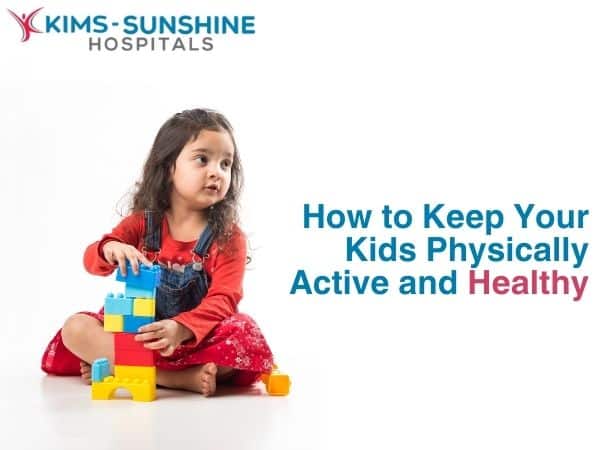
How to Keep Your Kids Physically Active and Healthy

Many of us are guilty of asking our kids not to play as we think it is a massive waste of time. But, we couldn’t be more wrong! After a long day at school, we ask them to maybe nap a bit. Then we get insecure about low marks and grades and ask them to start studying or finish up homework. Our own work schedules clash with school timings and we get tired ourselves because we are human too. We keep repeating this until kids themselves lose all interest in wanting to play. Does it make sense to feel bad later on? Nope, we can’t really blame them either! So, how can we make time for play and make it fun in the process?
Fun Ways To Keep Kids Active
Research has shown that any kind of dedicated play is great for brain development in children. It teaches them how to mingle with other kids, they get to learn some rules in the process and learn a little more about themselves and the world this way. They also learn some very important life skills- like interaction, negotiating with others, builds confidence in themselves and they own up to their abilities. If they lose, they learn coping mechanisms. They learn independence and more about teamwork too, in the same setting though these may seem contradictory in nature. Physical activity like running, jumping, being chased, kicking around, throwing or dribbling a ball are great for improving coordination. You can decide to mix it all up and play indoors or outdoors on alternating days.
- For very young children – tummy time is great.
- 1-2 year olds – You can throw around a soft ball and ask them to play fetch. They may climb up on furniture with ease and learn to walk or run when younger. You can give them plenty of space to practice all these skills at home.
For older kids-
- If you have a pet at home – you can take your kid along when you walk them. You can also teach them about feelings that animals have and they can bond better this way.
- If school is near home, you could decide to walk back afterwards.
- You can enroll them in clubs or classes at school – for sports related activities, yoga, dance, karate etc. Playing instruments in the band can be cool and marching with flags held high can make them feel more confident.
- Keep a dedicated play area at home or if you have a yard, all the better.
- You could teach them to cycle. You can squeeze in some road safety information this way.
- Try exploring different parks and play areas and see what your child likes better.
- You can teach kids how to play hopscotch at home or out, using chalk or tiles for outlines.
- You could play active video games for some time – like playing tennis, bowling, dancing, hula hoops etc.
- You can teach them to skip – they can burn off excess energy this way.
- Playing hide and seek is a great way to learn more about finding stuff in real life. It teaches them to use deductive skills in a fun setting.
- You can cordon off an area at home and keep it stocked with toys and other age appropriate items.
- You can come up with prizes for something they win.
- You can call other kids over and let them play.
Importance Of Physical Activity For Children
Physical activity teaches children to interact with others. They get to learn about how their health improves – their hearts beat faster and blood flows quicker. Their muscles and bones get stronger. They won’t feel as lethargic as before. Their hand-to-eye and full body coordination improves. They won’t strain their eyes so much because they are not always stuck to a screen. Their hormones work better and their moods are more regulated. As to how much kids need to play everyday – an hour or more is recommended when they are between 6-17 years of age. Their weight is maintained and their joints are not greatly stressed either. They are way more flexible and won’t injure themselves.
Conclusion
Adolescent and childhood obesity rates are higher than ever these days. This can be attributed to less and or almost zero physical activity. Parents don’t like play time either as it can get stressful managing schedules. It is best if you remember this- try to find an activity that you and your child would enjoy. This way you will be more involved. This is very essential if they are young especially. Older kids get more independent and hence need more freedom. Don’t stress out too much and play time can be fun for everyone!
Frequently Asked Questions
What are the benefits of regular exercise for children?
Playing everyday helps their heart stay healthy, helps them make Vitamin D and makes bones and muscles stronger in the process.
What are some fun activities to keep kids physically active?
Walking the pet, backyard sports competitions, skipping or playing hopscotch, board games to flex their mental acuity- mix it all up and see what happens. There are many others obviously!
How does physical activity affect kids’ mental health?
Regular play till the age of 15 years can greatly reduce the chances of an individual suffering from depression later on in adulthood. They also learn to get better at decision making and to compromise better in the long run.
Can screen time negatively impact my child’s physical health?
Yes, they may complain of eye strain, neck pain, poor posture and anxiety as they don’t know how to react to a real life situation and cannot fall asleep easily. Keep screen time limited to an hour everyday and not more than that.
How important is a balanced diet for keeping kids healthy and active?
Food is very important in this whole equation. Good quality food can ensure better immunity and health overall. Portion size is another factor to keep in mind. You can also teach them mindful eating techniques slowly but surely.

Dr. CH. Gopal
MBBS, DCH
Consultant Paediatrician






